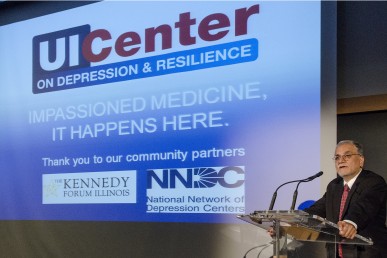Campus launches Center on Depression and Resilience

Mental health advocate Patrick Kennedy speaks at the launch of the new Center on Depression and Resilience. Photo: Joshua Clark/UIC Photo Services
By Rick Asa
Former Congressman Patrick Kennedy bluntly told a capacity audience of his own bouts with mood disorders and substance abuse in an impassioned keynote speech Oct. 21 to launch the new Center on Depression and Resilience.
In a booming voice, Kennedy praised UIC for its vision of a multidisciplinary, translational approach that will attack mental illness in the same way any leading institution would go after cancer and cardiovascular disease: with leading edge science, technology and experts who “treat the brain like it’s an organ of the body.”
The center, based in the College of Medicine’s department of psychiatry, includes practitioners, educators and researchers in pharmacy, nursing, engineering, public health, psychology and social work, as well as the Institute for Juvenile Research and the UIC Veterans Program.
The center is a member of the National Network of Depression Centers, a consortium of 20 academic medical centers.
Anand Kumar, head of psychiatry who worked to pull the center together, addressed an audience that included Chancellor Paula Allen-Meares, former deans and national figures in the mental health community.
“We think this is a first step, the first step toward our creating a broader center on mental illness and resilience overall,” Kumar said at the event, held in the College of Medicine Research Building.
“I love the family approach that you are undertaking here,” said Kennedy, a longtime champion of parity in the prevention and treatment of mental illness and an outspoken critic of the societal stigma it carries.
“I love the fact that you are addressing the parents’ challenges in order to address the kids’ challenges and I love the focus in treating depression by preventing depression.
“I love the focus you have on resiliency and figuring out what the mechanisms to build resiliency are.”

Anand Kumar, head of psychiatry, speaks at the opening of the Center on Depression and Resiliance. Photo: Joshua Clark/UIC Photo Services
Kumar described the economic toll of mental illness, citing data from a worldwide study that put disorders of the brain at the top of the list. If conditions such as substance abuse and anxiety are included, it’s an astronomical drain on resources. And yet, he noted, depression is severely undertreated, basic mechanisms responsible for mood disorders remain a mystery and funding toward answers has been slashed.
Suicide “is a topic that most people are uncomfortable with,” Kumar said, but data from the Centers for Disease Control and Prevention reports that more people die from suicide than homicide in the U.S. “This point alone is worthy of thought,” he said.
“If you look at the disconnect between national health priorities, our patient resources and inadequate discussion, this would be one of the topics.”
